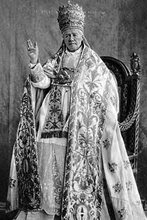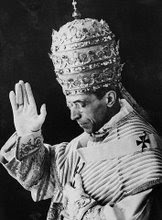100 Years of the motu proprio Præstantia Scripturæ Sacræ
...[W]e find it necessary to declare and to expressly prescribe, and by this our act we do declare and decree that all are bound in conscience to submit to the decisions of the Biblical Commission relating to doctrine, which have been given in the past and which shall be given in the future, in the same way as to the decrees of the Roman congregations approved by the Pontiff; nor can all those escape the note of disobedience or temerity, and consequently of grave sin, who in speech or writing contradict such decisions, and this besides the scandal they give and the other reasons for which they may be responsible before God for other temerities and errors which generally go with such contradictions.
Moreover, in order to check the daily increasing audacity of many modernists who are endeavoring by all kinds of sophistry and devices to detract from the force and efficacy not only of the decree "Lamentabili sane exitu" (the so-called Syllabus), issued by our order by the Holy Roman and Universal Inquisition on July 3 of the present year, but also of our encyclical letters "Pascendi dominici gregis" given on September 8 of this same year, we do by our apostolic authority repeat and confirm both that decree of the Supreme Sacred Congregation and those encyclical letters of ours, adding the penalty of excommunication against their contradictors, and this we declare and decree that should anybody, which may God forbid, be so rash as to defend any one of the propositions, opinions or teachings condemned in these documents he falls, ipso facto, under the censure contained under the chapter "Docentes" of the constitution "Apostolicae Sedis," which is the first among the excommunications latae sententiae, simply reserved to the Roman Pontiff. This excommunication is to be understood as salvis poenis, which may be incurred by those who have violated in any way the said documents, as propagators and defenders of heresies, when their propositions, opinions and teachings are heretical, as has happened more than once in the case of the adversaries of both these documents, especially when they advocate the errors of the modernists that is, the synthesis of all heresies.
Wherefore we again and most earnestly exhort the ordinaries of the dioceses and the heads of religious congregations to use the utmost vigilance over teachers, and first of all in the seminaries; and should they find any of them imbued with the errors of the modernists and eager for what is new and noxious, or lacking in docility to the prescriptions of the Apostolic See, in whatsoever way published, let them absolutely forbid the teaching office to such; so, too, let them exclude from sacred orders those young men who give the very faintest reason for doubt that they favor condemned doctrines and pernicious novelties. We exhort them also to take diligent care to put an end to those books and other writings, now growing exceedingly numerous, which contain opinions or tendencies of the kind condemned in the encyclical letters and decree above mentioned; let them see to it that these publications are removed from Catholic publishing houses, and especially from the hands of students and the clergy. By doing this they will at the same time be promoting real and solid education, which should always be a subject of the greatest solicitude for those who exercise sacred authority.
Given at Rome in Saint Peter's, the 18th November, 1907, the fifth year of our Pontificate.
Pope Saint Pius XPræstantia Scripturæ Sacræ
Tuesday, November 27, 2007
Saturday, February 03, 2007
Description of Jesus, given by Tiberius Ceasar's President to Judae
The following was written by Publius Lentulus, Tiberius Caesar’s President to Judea.
"There is a man in Judea who I am amazed to have witnessed, and who will now describe to you. He is a man of singular virtue. Whose name is Jesus Christ whom the barbarians esteem as a prophet, but his followers love and adore him as the offspring of the immortal God. He calls back the dead from their graves and heals all sorts of diseases with a word or a touch. He is a tall man, well shaped, and of an amiable and reverential aspect. His hair is of a color that can hardly be matched. It falls into graceful curls, waving about and very agreeably couched about his shoulders. It is parted on the crown of his head, running as a stream to the front after the fashion of the Nazarites. His forehead is high, large and imposing. His cheeks are without spot or wrinkle. His face is most beautiful with a lovely red. His nose and mouth formed with exquisite symmetry. His beard is of a color suitable to his hair, reaching below his chin and parted in the middle like a fork. His eyes are bright and blue. They are clear and innocent, dignified, manly and mature. Often times however, just before he reveals his divine powers, his eyelids are gently closed in reverential silence. In proportion of body it is most perfect and amazing to view.
His arms and hands are lovely to behold. He rebukes with majesty, and counsels with mildness to who he addresses. Whether in word or deed he is eloquent and sincere. No man has seen him laugh; yet his manners are exceedingly pleasant. But he has wept frequently in the presence of men. He has temperate, modest and wise disposition; a man for his extraordinary beauty and divine perfection. He has a beauty and divine perfection, surpassing the children of men in every sense.
"There is a man in Judea who I am amazed to have witnessed, and who will now describe to you. He is a man of singular virtue. Whose name is Jesus Christ whom the barbarians esteem as a prophet, but his followers love and adore him as the offspring of the immortal God. He calls back the dead from their graves and heals all sorts of diseases with a word or a touch. He is a tall man, well shaped, and of an amiable and reverential aspect. His hair is of a color that can hardly be matched. It falls into graceful curls, waving about and very agreeably couched about his shoulders. It is parted on the crown of his head, running as a stream to the front after the fashion of the Nazarites. His forehead is high, large and imposing. His cheeks are without spot or wrinkle. His face is most beautiful with a lovely red. His nose and mouth formed with exquisite symmetry. His beard is of a color suitable to his hair, reaching below his chin and parted in the middle like a fork. His eyes are bright and blue. They are clear and innocent, dignified, manly and mature. Often times however, just before he reveals his divine powers, his eyelids are gently closed in reverential silence. In proportion of body it is most perfect and amazing to view.
His arms and hands are lovely to behold. He rebukes with majesty, and counsels with mildness to who he addresses. Whether in word or deed he is eloquent and sincere. No man has seen him laugh; yet his manners are exceedingly pleasant. But he has wept frequently in the presence of men. He has temperate, modest and wise disposition; a man for his extraordinary beauty and divine perfection. He has a beauty and divine perfection, surpassing the children of men in every sense.
Subscribe to:
Posts (Atom)



















